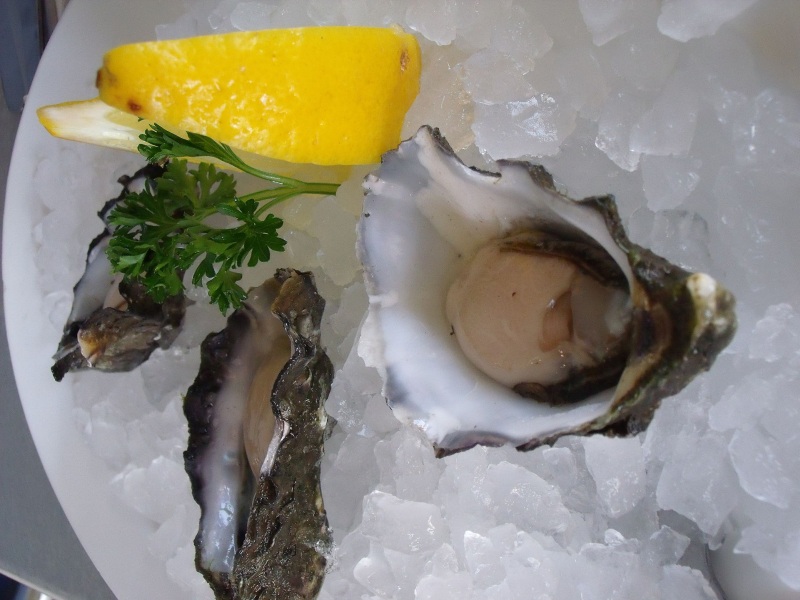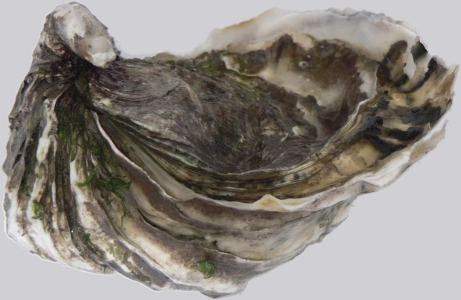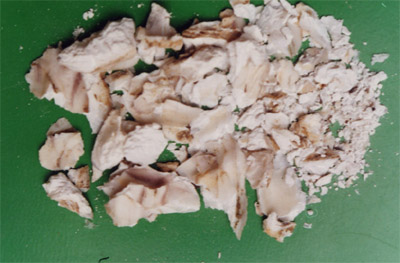 Ostreidae- family Ostrea gigas, Ostrea
edulis 牡
蛎 Mǔ lì, Hai ko
Oyster
Ostreidae- family Ostrea gigas, Ostrea
edulis 牡
蛎 Mǔ lì, Hai ko
Oyster
Many, but not all, oysters are in the superfamily Ostreoidea.
 Ostreidae- family Ostrea gigas, Ostrea
edulis 牡
蛎 Mǔ lì, Hai ko
Oyster
Ostreidae- family Ostrea gigas, Ostrea
edulis 牡
蛎 Mǔ lì, Hai ko
Oyster
Many, but not all, oysters are in the superfamily Ostreoidea.
FLAVOR: Sweet and salty
FUNCTIONS
1. Blood tonic.[4]
INDICATIONS
1. Insomnia, stress and nervousness.[4]
PREPARATIONS:

- Tuberculosis of the lymph nodes and goitre- Eat 15 to 25 oysters at meals.[4]
Use oster source as seasoning if fresh oyster is not readily available.[4]


Ostrea
gigas, O. cucullata, Crassostrea gigas- Pacific oyster 牡蠣 Mǔ lì-
"Male oyster" Oyster
shells Phyllum:
Mullusca Class: Bivalve
FLAVOR: Salty, astringent, harsh,
acrid CHANNEL: Liver, Kidney
FUNCTIONS
GROUP: Calm Spirit- Strong
1. Calm Spirit.
2. Soften hard lumps and disperse stagnated mass.[4]
Breaks up congestion.[1]
3. Suppress Yang - Benefit Yin and suppress Yang. Moderates Yang.[1]
Clears fever.[1] Solidify and constrict.[1]
Obstructive.[4]
4. Calm the Liver.
5. Astringe and invigorate the Kidney to preserve essence.
6. Antacid, analgesic, astringent.
7. Clears Lung Heat, resolved phlegm and stops coughing.[1]
INDICATIONS
1. Excess Liver Yang with Yin Deficiency. Manifesting as dizziness, tinnitus,
irritability and insomnia, convulsion due to affection of Wind originated from
excess Liver Yang and febrile diseases with consumption of Yin. Hypertension
and dizziness.[1] Vertigo.
2. Lumps- Subcutaneous nodule, scrofula. Goitre.[4]
Tuberculous cervical nodes.[1] Lymphatic
tuberculosis.[4]
3. Kidney Deficiency manifested as seminal emission.[1,2,3]
Premature ejaculation.[4] Enuresis.
Menorrhagia. Metrorrhagia.[1] Leukorrhea.
Vaginal bleeding and discharge.[4]
Spontaneous perspiration and night sweat.[1,2,3,4]
Insomnia, palpitation. Checks excessive perspiration and premature ejaculation.[4]
4. Hyperactivity- Peptic ulcer. Hyperacidity. Hyperthyroidism. Hydrosis.[1]
5. Goitre.[4]
6. Coughing and wheezing, Lung congestion, hemoptosis.[1]
PREPARATIONS: Decoction of pulverized
shell 9-30 g. for each dose.[1] Powder
can be injested.
External use- Appropriate amount.[3]
- Excessive gastric acid- Crush oyster shell into powder and wrap 15 g of the
powder in a cloth. Boil in 3 cups water over low heat until the water is reduced
to 1 cup. Drink as tea before a neal, once a day. Or grind the shell into very
fine powder and take 3 g of the powder, each time with warm water, 3 times a
day.[4]
Clinical study: Night sweat in pulmonary tuberculosis- Boil
20 g oyster shell in 500 ml water until the water is reduced to 200 ml (Sugar
may be added, if desired.) Divide into 2 dosages and drink in the morning and
in the evening for a few consecutive days. After the night sweat stops, the
treatment continues for another 2 to 3 days to stablilize the effects. Herbal
therapy may be used in combination, if no satisfactory results are obtained.
In the 10 cases treated, after taking 2 to 3 dosages night sweat disappeared
in 7 cases, 3 showed no obvious results, but 2 recovered after being treated
in comination with other herbs. No side effects were observed.[4]
